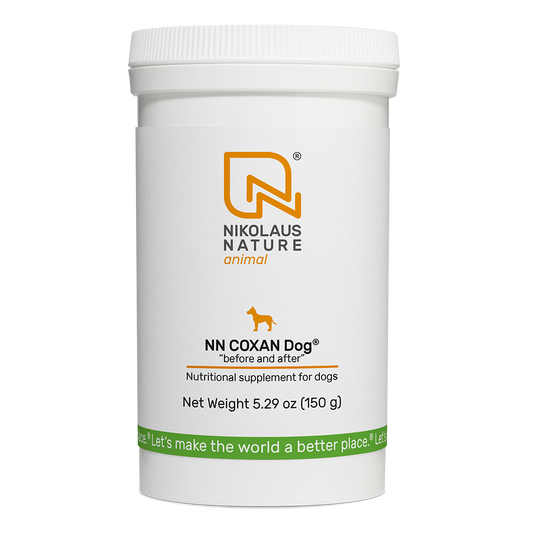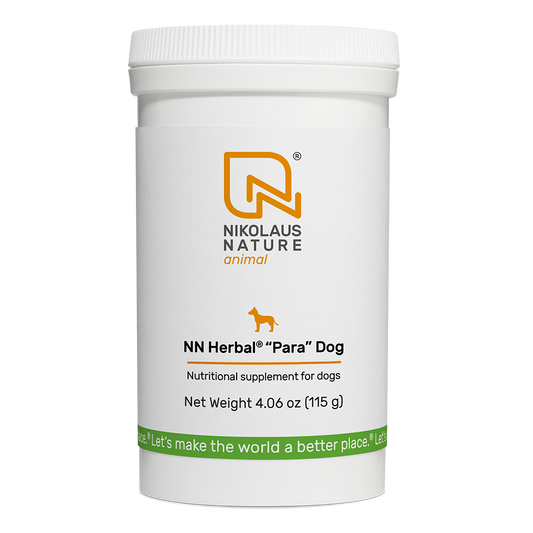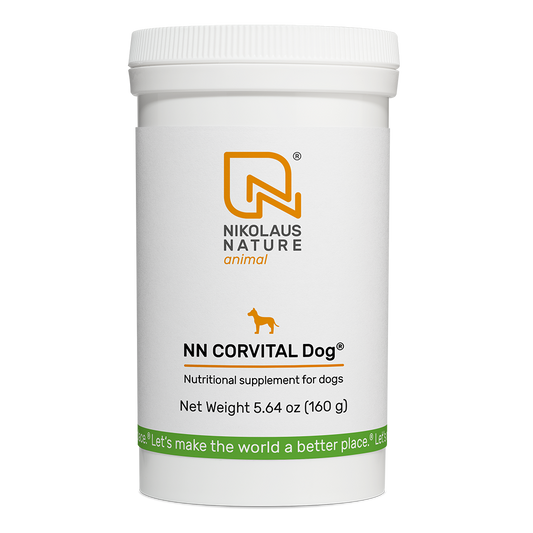Milk Thistle for Dogs
The liver performs over 500 vital functions in your dog’s body. This powerhouse organ works tirelessly, filtering toxins, aiding digestion, and even regulating hormones. But what if this vital organ is silently struggling?
Liver disease is a leading cause of death in dogs, and certain breeds like Dobermans, Labrador Retrievers, and Cocker Spaniels are genetically predisposed to liver problems. Some medications and environmental factors can also put extra stress on this vital organ.
So, what can you do to protect your dog’s liver?
Milk thistle is a natural herb that's been used for centuries to support liver health in both humans and animals. This botanical plant has the potential to aid the liver in detoxification, reduce inflammation, and even promote the regeneration of damaged liver cells.
Keep reading to know the benefits of this powerful herb and learn how it could help your dog lead a good life.

What is Milk Thistle?
Milk thistle is scientifically known as Silybum marianum. It belongs to the Asteraceae family, which also includes sunflowers and daisies. Milk Thistle is also known by the name Marian thistle or holy thistle and is recognized for its purple and green flower with milk-white veins on its leaves. However, the true magic of milk thistle lies in its active ingredient – silymarin.
What Is Silymarin?
Silymarin is a bioflavonoid complex and is extracted from the seeds of the milk thistle plant. It is composed of an isomeric mixture that contains silibinin, isosilybin, silychristin, silydianin, and taxifolin compound.
Among all, silibinin is the most biologically active component that is responsible for the plant's medicinal effects – mainly in liver health.
The silymarin complex has several mechanisms of action that contribute to its therapeutic effects. It has also been shown to have potent antioxidant and anti-inflammatory properties.
Benefits of Milk Thistle for Your Dog
Milk thistles not only have potential benefits in supporting liver health but also have a wide range of positive effects throughout the dog's body.
Liver Health
Milk thistle is best known for its ability to support liver health in dogs. Silymarin is a powerful antioxidant that helps protect liver cells from damage and promotes the regeneration of new liver cells. This makes milk thistle beneficial for dogs with liver disease, such as chronic hepatitis, cirrhosis, or liver cancer. It can also help dogs recover from liver damage caused by toxins, free radicals, medications, or yeast infections.
Detoxification
The liver is responsible for breaking down and eliminating toxins from the body and milk thistle enhances this detoxification process by increasing the production of glutathione – a key antioxidant that binds to toxins and heavy metals so they can be flushed out.
For example, dogs living in areas with high pollution levels or those undergoing chemotherapy benefit from milk thistle's detoxifying effects.
Digestive Health
Milk thistle also improves digestive health in dogs. The anti-inflammatory properties of silymarin can help soothe irritated digestive tissues and reduce inflammation in the gut. This makes milk thistle beneficial for dogs with inflammatory bowel disease, colitis, or other gastrointestinal disorders.
Milk thistle also stimulates bile production, which is essential for proper digestion and absorption of fats and fat-soluble vitamins. In this way, it maintains a strong immune system and overall well-being by promoting healthy digestion.
Diabetes Management
Some research shows that milk thistle helps manage diabetes in animals by improving insulin sensitivity and reducing blood sugar levels in diabetic animals. It protects the pancreas from further damage and supports the regeneration of insulin-producing cells.
If you are adding milk thistle to your dog’s diabetic regimen, you may need to adjust its insulin dose after discussing it with your veterinarian.
While more research is needed, milk thistle can be a useful complementary therapy for dogs with diabetes, especially when combined with a healthy diet and exercise regimen.
Cancer Prevention
Milk thistle's antioxidant and anti-inflammatory properties inhibit the growth of some cancer cells and prevent them from spreading to other parts of the body. It also enhances the effectiveness of certain chemotherapy drugs while reducing their side effects.
Allergy Relief
The liver plays a role in removing histamine from the body. If the liver is weakened and can't break down toxins, histamines can build up and cause more allergic reactions like atopic dermatitis, hot spots, etc. Milk thistle can help cleanse the liver and potentially reduce allergy symptoms like hives, asthma, and sneezing.
Kidney Support
It improves kidney function if damage is caused by pharmaceutical medications, radiation therapy, diabetes, and various infections. Silymarin can reduce drug-induced kidney toxicity that leads to kidney failure in dogs.
Other Benefits
- Milk thistle may improve the signs of pancreatitis.
- According to research, silymarin helps relieve giardia infections in dogs.
Is Milk Thistle Safe for Your Dog?
Yes, milk thistle is generally safe for dogs when given in moderate amounts and under the guidance of your veterinarian. It’s important to understand that this supplement is not a substitute for regular veterinary care. Moderate use of milk thistle is very safe, but long-term ingestion of high dosages suppresses liver function and causes minor side effects like loose stools or mild digestive upset in some dogs – especially if they are not used to taking supplements.
Caution: Milk thistle is not recommended for pregnant or lactating dogs due to a lack of thorough studies on its safety during these periods.
What Drugs Interact With Milk Thistle?
While milk thistle is generally safe, it can alter the metabolism of some drugs that are broken down by the liver – potentially increasing or decreasing their effectiveness. Examples include:
- Antibiotics (such as Amoxicillin andMetronidazole)
- Anti-seizure medications
- Chemotherapy drugs
- Corticosteroids
- Nonsteroidal anti-inflammatory drugs (NSAIDs)
- Some Supplements (Fish oil)
If your dog has any pre-existing condition or is on the above medications you should consult with your veterinarian first.
How to Give Your Dog Milk Thistle?
Now that you know the benefits and safety of milk thistle, let's talk about how to actually give it to your furry friend. This herbal supplement is commonly available in various forms, including tablets, capsules, liquid extracts, and powder. The choice of form can depend on the dog's size, preference, and how easy it is for you to administer.
Capsules and tablets can be given directly or hidden in food or treats and it’s easier for your dogs to ingest without noticing.
Liquid extracts can be mixed with the dog's food or water. It’s a convenient method for those who don’t like taking pills. And, always follow the instructions on the label or consult your veterinarian for guidance.
Dosage
The standard dosage of milk thistle extract is based on the silymarin content present in a supplement which is around 70-80%.
The dosage of milk thistle for dogs varies based on the dog's weight and health condition. For healthy dogs, the recommended dosage is approximately 2 mg of milk thistle per pound of the dog's weight. This can go up to 10 mg per pound for dogs with liver disease or issues, but it's important to consult with your veterinarian before giving high doses.
It's also important to consider the silymarin content in the supplement – typically it ranges from 50-500 milligrams, with 100-150 mg being more common in some capsules.
For example, if a product contains 100 mg of milk thistle extract. You should give 1 ⁄ 2 a capsule to a 20 lb dog per day. For dogs weighing 25 to 50 pounds, give 1 capsule per day. For dogs over 50 pounds, give 1-2 capsules per day.
Splitting the daily dose into smaller portions throughout the day is more effective than a single large dose. It's advisable to consult a veterinarian for precise dosing instructions according to your dog's needs.
Which Dogs Get Benefit Most From Milk Thistle?
Senior dogs – whose liver function naturally declines with age – can benefit from milk thistle's ability to support liver cell regeneration and detoxification. It's like offering them a helping hand to maintain their vitality in their golden years.
Furthermore, breeds predisposed to liver problems, such as Bedlington Terriers, Doberman Pinschers, and Labrador Retrievers, benefit from milk thistle as a preventive measure. You can help delay the onset or progression of liver disease by supporting liver health early on.
Also, working dogs or performance dogs involved in strenuous activities or performance tasks may benefit from milk thistle to support detoxification and protect against oxidative stress caused by their increased physical demands.
As working and senior dogs age, their joints can often become stiff and uncomfortable. Adding a joint supplement like NN COXAN Dog - Joint Supplement can provide essential nutrients like glucosamine and chondroitin to promote joint health and flexibility. Remember, you can offer multiple supplements to your dog, but it's best to spread them out across different meals for optimal absorption and effectiveness.

FAQ About Milk Thistle for Dogs
Can milk thistle reverse liver damage in dogs?
Milk thistle cannot fully reverse existing liver damage, but it can help support the liver's natural healing process by regenerating the liver cells and protecting it from further damage.
Should I add milk thistle to my dog's regular diet?
Adding milk thistle to your dog's regular diet is beneficial, especially for dogs with liver problems and other conditions like acute or chronic hepatitis, Cushing's disease, diabetes, and pancreatitis. Milk thistle's antioxidant and anti-inflammatory properties support liver health and aid in the treatment of liver diseases. However, it's always best to consult with your veterinarian before making any changes to your dog's diet or adding supplements.
Is it safe to give my dog milk thistle every day?
Milk thistle is generally regarded as safe for dogs but it is advised not to give it daily for extended periods. Milk thistle should not be given for more than 3-6 weeks at a time, and breaks in between treatments. High doses should be avoided without veterinary guidance.
Sources
-
National Library of Medicine, “Silymarin as Supportive Treatment in Liver Diseases,”
https://pubmed.ncbi.nlm.nih.gov/32065376/ -
Science Direct, “Milk thistle (Silybum marianum) for the therapy of liver disease”,
https://www.sciencedirect.com/science/article/abs/pii/S0002927097000828 -
National Library of Medicine, “Role of silymarin as an antioxidant in the clinical management of chronic liver diseases,”
https://pubmed.ncbi.nlm.nih.gov/35635048/ -
National Library of Medicine, “Selectivity of silymarin on the increase of the glutathione content,”
https://pubmed.ncbi.nlm.nih.gov/2813578/ -
National Library of Medicine, “The therapeutic potential of milk thistle in diabetes,”
https://pubmed.ncbi.nlm.nih.gov/25396404/ -
National Library of Medicine, “Silymarin in the treatment on asymptomatic Giardia infections,”
https://pubmed.ncbi.nlm.nih.gov/16151741/ -
Research Gate, “Dietary supplements containing silymarin as a supportive factor in the treatment of canine hepatopathies”
https://www.researchgate.net/publication/344605117_Dietary_supplements_containing_silymarin_as_a_supportive_factor_in_the_treatment_of_canine_hepatopathies -
Science Direct, “Effects of silymarin on type 2 diabetes mellitus”,
https://www.sciencedirect.com/science/article/abs/pii/S2451847621000518







